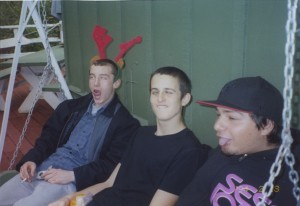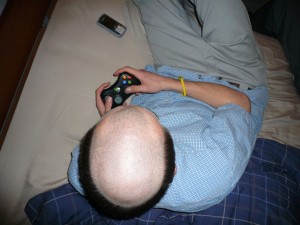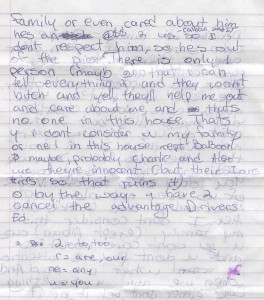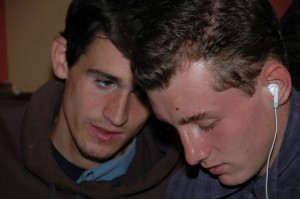
This one is worth a click! The afflicted here are Alban and Tom and their buddy Andrew. They were all around seventeen in this photo, taken by another of their friends. Note the cigarette in Alban’s hand, if you can look away from the antlers, that is!
Charlie and Alex spent the week before Christmas in 2010 with me and Tom, who was visiting from Paris. They were going to spend the week beginning the afternoon of Christmas Day with their maman. It was a hectic week, fitting in locating and packing presents around so many significant social obligations, especially for Charlie.
Come Christmas morning, as we all unpacked our presents, he apologized profusely. My present was at a friend’s house, he explained, and by the time he had figured that out he couldn’t recover the present in time for Christmas.
“That,” I told him, “is because you’re a teenager!”

Only the back of his head is visible, and only a piece of that (bottom right), but this is Nick playing poker in Paris in 2007: most of the visible chips are in front of him! He really enjoys his poker. This came from MySpace.
Which is true in a way. Carl Galewski used to talk about how science had proved that the adolescent brain is not yet fully formed, and that the parts of the brain still growing were the parts that will create mature behavior.
He didn’t say it like that, but that was the thrust of the argument, that the emotional failings of teenagers (“failings” because he was talking from a parent’s point of view) could be attributed to unfinished business in their developing brains.
Whether or not Carl’s observation is scientifically accurate, it does not capture the real dynamic of teenagers with a capital T from the point of view of their parents. A teenager is a child or young adult of between 13 and 19 years of age. A Teenager with a capital T is a youth with an attitude. If you’re a parent, that attitude is expressed against you: not you alone, but you’re right up there on the list. And that perplexes and disorients and, yes, hurts, which is the key dynamic. How did our very own sweethearts come to this?!

Alban has consistently taken the cake for his hair don’ts! This monk cut was best seen from above. Note the video game controller in his hands.
We can’t condemn that dynamic, of course. We’ve learned that the growing person needs to define himself or herself in part by opposition to what came or went before, and that the parents are available representatives of what came before. We were all teenagers once, and we remember how we acted in our turn. In retrospect, we realize at least part of the time how much we upset our parents, in many cases without intending to.
But I don’t care how much you’ve learned in higher education and from your experiences of the adolescence of others, nothing prepares you for when your children inflict it on you. For one thing, they all really get into expressing that adolescent rebellion, each in his or her respective way. I wasn’t ready for the sheer unbridled enthusiasm with which they all found fault with us.

The second page of Daphné’s long note to her mother bemoaning how badly she felt that she was being treated in our family. The words at the end of the previous page are “Ian, I’ve never considered him . .”. Click to read.
They’re entitled to go through this long and arduous (for the parents) phase of their lives. It is healthy that they do so. If they never do so, they will never grow up, up and away, as they must. That’s what you keep telling yourself as a parent. And it still perplexes and hurts, for however long it lasts. And it lasts for quite a while.
I was deeply upset, for years, by a letter that Daphné wrote to Marie-Hélène in June 2003, just before I started working down in Newport Beach every week. She was almost 16. If there is a killer age for Teenagers with a capital T, that’s it!
The worst part is where she writes that Charlie and Alex would be okay, part of her family, were it not for the fact they are my children too: “that ruins it.” Well okay, she was angry about something or other, and wanted to ensure that her maman backed her up in future, and probably shouldn’t have put pen to paper.

“No pick up” for Nick after school, because he had been “too unpleasant” the previous evening. I believe it, but not being picked up created quite a challenge for Nick. His school was four miles from home!
That’s why it’s here, by the way, because she did put pen to paper, not because she was more or less a Teenager with a capital T than our other children. Because this particular explosion was in writing, it’s a good illustration of a tendency, a period, a kind of expression that they all went through and that the whole family suffered through.
Plus, from the parent’s point of view, the note has that gratifying indication that things were not as bad as they felt to her at the time, a built-in proof that this adolescent was on some rational level wrong, at least in part. That’s what parents need, to help them get through the onslaught of Teenagers with a capital T, occasional proof that they are wrong, at least in part, at least in rational terms!

This photo just oozes Teenager with a capital T, in this case Nick! The children are in a Hummer limo heading for San Francisco Airport and then on to Europe. Happy? No way. Nick won’t even look at Marie-Hélène’s camera (I wasn’t there), and neither Tom nor Charlie would smile. That’s one of the difficulties with Teenagers with a capital T, by the way, their influence on the younger siblings.
Check out the last sentence: she has to cancel driver’s ed. Ah-hah! So she’s doing driver’s ed., at the age of 15, the earliest that you can learn to drive in California. It’s not cheap, and her step-dad was paying for that. Learning to drive meant that she’ll likely be given a car in the not-too-distant future! Her step-dad would pay for that too, and happily. How can she be feeling so hard done by, so deprived relative to the other children?
The note also confirms the parent who suffered the most at the hands of our adolescents: Marie-Hélène. I was away at work every weekday, or every week during 2003-4, when we were struck by that first wave of Teenagers with a capital T, Nick and Daphné. She was there, in the line of fire, every day. Over time, it distressed her deeply, and wore her down. Not only was she being attacked by her stepchildren, but also by her own children, like Daphné in her note.
The Teenagers also suffer through being teenagers, which it is easy to forget. Whatever they say, they still love and need their parents, even their step-parents. Little things, unintentional things, hurt them dreadfully. Maybe those little things had the same effect when they were younger. They probably did.

As the pressure mounted, we hung this advice on the wall at home. Needless to say it was studiously ignored by all concerned!
But a Teenager lets you know all about it! Tom rigged up an old army kit bag full of squished up newspapers and hung it at the back of the car port. From time to time, I don’t really know how often, he would go out there and punch the hell out of that kit bag.
Less frequently, we’d find a hole in the bedroom sheetrock where one of the older boys (the younger hadn’t reached this age during the period covered by this web site) had put a fist, or maybe a harder object, through it in a moment of rage. Typically, the hole was then covered up with a poster or photograph and we’d only find it months or years later. You may not see it as it happens, but in some way they’re going to let you know.

What garbled story was I told to explain these holes in the studio bathroom door in 2005? That Tom was afraid that someone was in trouble in the bathroom, and thus elected to beat hell out of the door? Something like that. We replaced the door.
At times, there are clearer expressions of what they are feeling inside. We were lucky to have those coherent moments, because Teenagers with a T have a notorious difficulty communicating across generations.
Daphné’s note, quoted above, spelled it out very clearly. The quirk in our blended family was that the attitude of the Teenager with a capital T was expressed principally against the step-parent. She held her step-father more responsible for what ailed her than her maman, her biological parent. “Ian, I’ve never considered him family. He’s an ass to us, Alban and I, so I don’t respect him.” Yep, she was referring to me!

Teenager at play: Alban. How many things can you find wrong with this picture, taken by one of his friends? No helmet. No pads. He’s horizontal. He’s moving fast. He’s six feet above some very solid ground.
Nick did the same, writing in his High School Senior Portfolio in May 2004 that “I have a step-mother who hates me.” No, kiddo, she was bemused by you, sometimes overwhelmed by your energy or the conflict between you and Daphne over who would have the right to act like the oldest child in the household, but she never hated you, not even close.
Nick continued with his wanting to leave home, an inevitable and healthy feeling, but in his case he viewed it as “a feeling that was reinforced when my father moved to Orange County, leaving me to the mercy of my step-mother.” Ouch. Just like Daphné, he was demonizing the step-parent to seek help from the biological parent. As a parent, that kind of pressure is almost impossible to handle in a balanced manner.
The focus on the step-parent as the bearer of all that is bad reveals another factor which may have made our Teenagers with a capital T feel worse during these years, the earlier parental separations. I’m not sure of this one, because as teenagers we all find a reason that our respective lives are worse than the next boy’s or girl’s. If there really isn’t one, we’ll make one up. But the earlier separations had indeed been difficult for all concerned.

Marie-Hélène approaches Tom and Alban, who are delaying the inevitable moment when they will have to come to the table to share Mother’s Day brunch with us in 2007. They cringe, giving rise to a moment of real parental satisfaction!
Here’s Nick again, in that extraordinary Senior Portfolio: “my life has not been the easiest life. My parents, who have been divorced for 10 years, still hate each other as if the divorce happened yesterday, and they still each fight through me. Its very difficult to be a part of that.” I hear you, kiddo. My apologies.
Teenagers with a capital T have so many reproaches for their parents. I never adjusted to that!
Just as I never adjusted to the touching enthusiasm with which Teenagers spent time with the parents, especially when their friends were present: “dad, please don’t say anything embarrassing.”
“What’s embarrassing?”
“Just about everything you say!” This may have been an actual dialog. But it may not. It encapsulates how they felt.

The kind of communion that our Teenagers with a capital T share, between Nick and Alban in this case, is visible during a family birthday dinner, Tom’s eighteenth, in 2007 at Rosie McCann’s in downtown Santa Cruz.
At the same time as communication with the older generation is definitely reduced, communication between the Teenagers themselves worked very well most of the time. It helped that there were several of them simultaneously in the family: when the inevitable tiffs arose between this one or that one, there’s always someone left outside the pair concerned to find common ground with.
It’ll all work out okay: that’s what I told myself. And it did!
Here are other phases in the history of our four older children: Blending; To Santa Cruz; Missing You; Moving Out; Graduations I; and Graduations 2007. Our younger boys did not become teenagers until 2008 (when Charlie turned 13) and 2010 (when Alex turned thirteen).

